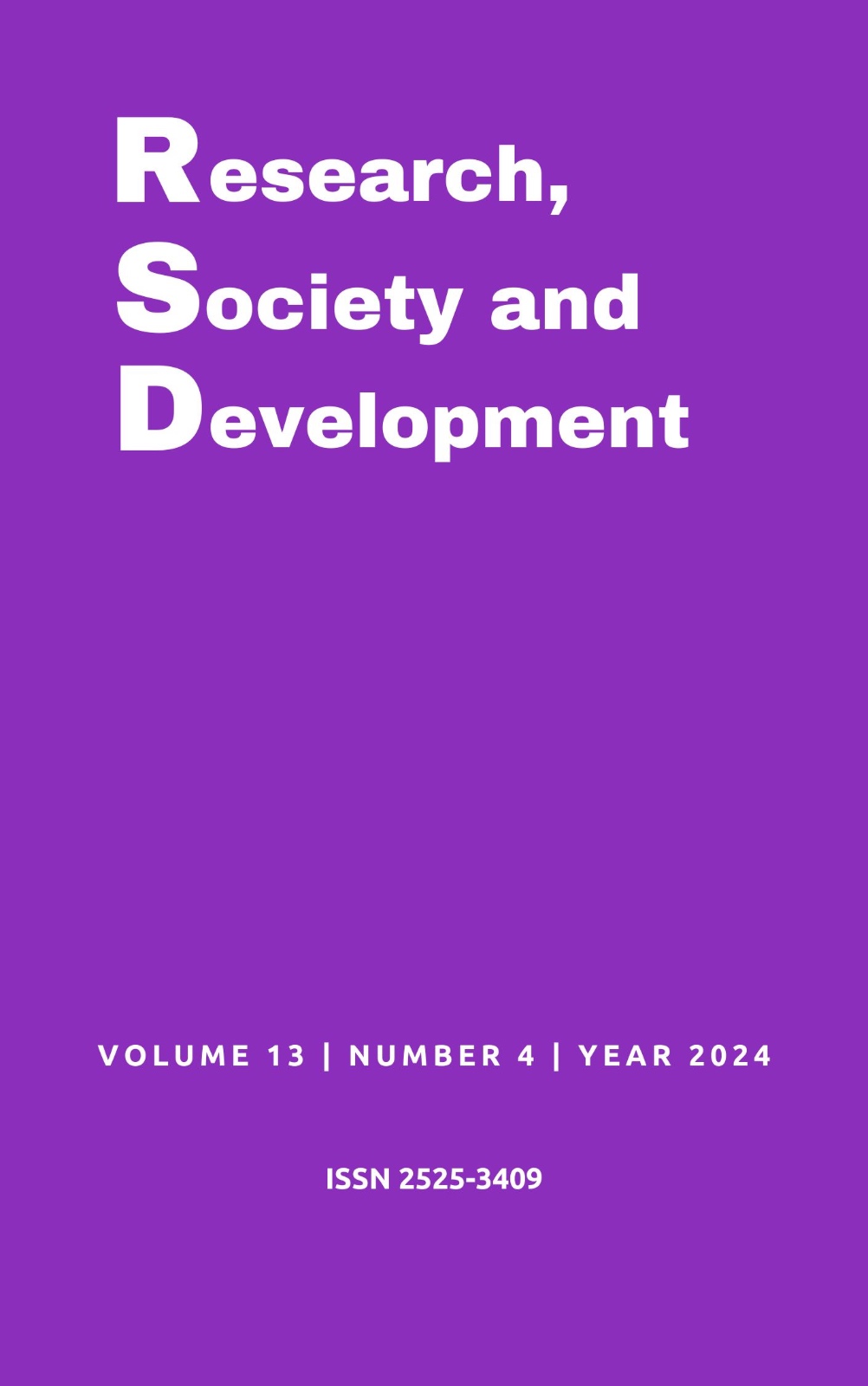O potencial da inteligência artificial no diagnóstico precoce e tratamento personalizado: Avanços e desafios na medicina moderna
DOI:
https://doi.org/10.33448/rsd-v13i4.45367Palavras-chave:
Inteligência artificial, Educação médica, Saúde.Resumo
A realização deste estudo, justifica-se pela sua relevância acadêmica, científica e social, pautada em apresentar os avanços tecnológicos que envolvem a inteligência artificial na saúde. Dessa forma, o objetivo desta pesquisa incide em evidenciar as aplicações e benefícios da Inteligência Artificial na Medicina. Este estudo foi realizado por meio de uma revisão integrativa da literatura, de abordagem exploratória, cujo instituto, se resumiu em investigar, através de artigos já publicados, informações relevantes que respondessem à pergunta norteadora. Assim, o levantamento de dados ocorreu nas bases científicas: SCIELO e LILACS. Uma das principais vantagens da utilização da IA no diagnóstico precoce é a capacidade de processar grandes volumes de dados de forma rápida e precisa, identificando padrões e sinais que podem ser imperceptíveis para os profissionais de saúde humanos. Isso possibilita a detecção precoce de condições médicas graves, como câncer e doenças cardíacas, quando o tratamento é mais eficaz e as chances de recuperação são maiores. Além disso, a IA pode contribuir significativamente para o tratamento personalizado, adaptando as abordagens terapêuticas com base nas características individuais de cada paciente. Ao analisar dados genéticos, histórico médico e resposta a tratamentos anteriores, os algoritmos de IA podem ajudar os médicos a desenvolver planos de tratamento mais eficazes e com menos efeitos colaterais.
Referências
Arias, V., Salazar, J., Garicano, C., Contreras, J., Chacón, G., Chacín-González, M., ... & Bermúdez-Pirela, V. (2019). Una introducción a las aplicaciones de la inteligencia artificial en Medicina: Aspectos históricos. Revista Latinoamericana de Hipertensión, 14(5), 590-600.
Braga, A. V., Lins, A. F., Soares, L. S., Fleury, L. G., Carvalho, J. C., & do Prado, R. S. (2018). Inteligência artificial na medicina. CIPEEX, 2, 937-941.
Braga, A. V., Lins, A. F., Soares, L. S., Fleury, L. G., Carvalho, J. C., & do Prado, R. S. (2019). Machine learning: O Uso da Inteligência Artificial na Medicina. Brazilian Journal of Development, 5(9), 16407-16413.
Garcia, M. L., & Maciel, N. F. (2020). Inteligência artificial no acesso a saúde: Reflexões sobre a utilização da telemedicina em tempos de pandemia. Revista Eletrônica Direito e Política, 15(2), 623-643.
Kaufman, D. (2019). A inteligência artificial irá suplantar a inteligência humana? Estação das letras e cores EDI.
Lucas, L. B., & dos Santos, D. O. (2021). Considerações sobre os desafios jurídicos do uso da inteligência artificial na medicina. Revista de Direito, 13(01), 01-25.
Leite, C. D. C. (2019). Inteligência artificial, radiologia, medicina de precisão e medicina personalizada. Radiologia Brasileira, 52, VII-VIII.
Lobo, L. C. (2018). Inteligência artificial, o Futuro da Medicina e a Educação Médica. Revista Brasileira de Educação Médica, 42, 3-8.
Mattos, P. D. C. (2015). Tipos de revisão de literatura. UNESP. 2.
Pinto, Ana Luiza Reis Paes et al. (2022). Conhecimentos, atitudes e práticas dos estudantes de medicina sobre inteligência artificial em uma faculdade do Brasil: estudo transversal. Faculdade Pernambucana de Saúde. 13(01), 01-25.
Ruiz, R. B., & Velásquez, J. D. (2023). Inteligência artificial ao serviço da saúde do futuro. Revista Médica Clínica Las Condes, 34(1), 84-91.
Santos, A. M. J., & Del Vechio, G. H. (2020). Inteligência artificial, definições e aplicações: o uso de sistemas inteligentes em benefício da medicina. Revista Interface Tecnológica, 17(1), 129-139.
Silva, J. A. S., & Mairink, C. H. P. (2019). Inteligência artificial. LIBERTAS: Revista de Ciênciais Sociais Aplicadas, 9(2), 64-85.
Santos, D. O., & Lucas, L. B. (2021). Considerações sobre os desafios jurídicos do uso da Inteligência Artificial na medicina. Revista da Faculdade de Direito da UFRGS, (46), 71-92.
Tomás, J. F., Mayer-Pujadas, M. A., & Quesada-Varela, V. J. (2020). La inteligencia artificial y sus aplicaciones en medicina I: introducción antecedentes a la IA y robótica. Atención Primaria, 52(10), 778-784.
Teixeira, J. (2019). O que é inteligência artificial. E-galáxia.
Osaki, M. (2018). Inteligência artificial, prática médica e a relação médico-paciente. Revista de Administração em Saúde, 18(72).
Oliveira, V., Augusto, V., & Karla, L. (2022). “Connect”: Um Relato de Experiência sobre um Evento de Tecnologia e Inteligência Artificial na Medicina. Brazilian Medical Students, 7(10).
Ortega, D. L., Pérez, D. L. C., & Esper, R. C. (2022). Inteligência artificial na medicina: presente e futuro. Gaceta médica de México, 158(10), 55-59.
Vargas, M., Biggs, D., Larraín, T., Alvear, A., Pedemonte, J. C., & de Anestesiologia, R. (2022). Inteligência Artificial em Medicina: Métodos de Modelagem (Parte I). Rev. Chil. Anest, 51(5), 527-534.
Downloads
Publicado
Edição
Seção
Licença
Copyright (c) 2024 Amanda Albuquerque Cursino B. Galvão; Romerio Alves Soares; Davi Silva Ramos; Ane Caroline Rodrigues de Oliveira; Lucélia Vital Leite; George da Silva Tenório Cavalcante; Felipe Alves Celestino de Moura; Ana Júlia de Oliveira Cavalcanti; Cristiane Ramos Santos Damaso; Lucilene Mororó Lima Correia; Marcelo Pininga Pessoa de Asevedo; Carlos André Souto Silva; Elison Lins Araújo

Este trabalho está licenciado sob uma licença Creative Commons Attribution 4.0 International License.
Autores que publicam nesta revista concordam com os seguintes termos:
1) Autores mantém os direitos autorais e concedem à revista o direito de primeira publicação, com o trabalho simultaneamente licenciado sob a Licença Creative Commons Attribution que permite o compartilhamento do trabalho com reconhecimento da autoria e publicação inicial nesta revista.
2) Autores têm autorização para assumir contratos adicionais separadamente, para distribuição não-exclusiva da versão do trabalho publicada nesta revista (ex.: publicar em repositório institucional ou como capítulo de livro), com reconhecimento de autoria e publicação inicial nesta revista.
3) Autores têm permissão e são estimulados a publicar e distribuir seu trabalho online (ex.: em repositórios institucionais ou na sua página pessoal) a qualquer ponto antes ou durante o processo editorial, já que isso pode gerar alterações produtivas, bem como aumentar o impacto e a citação do trabalho publicado.


